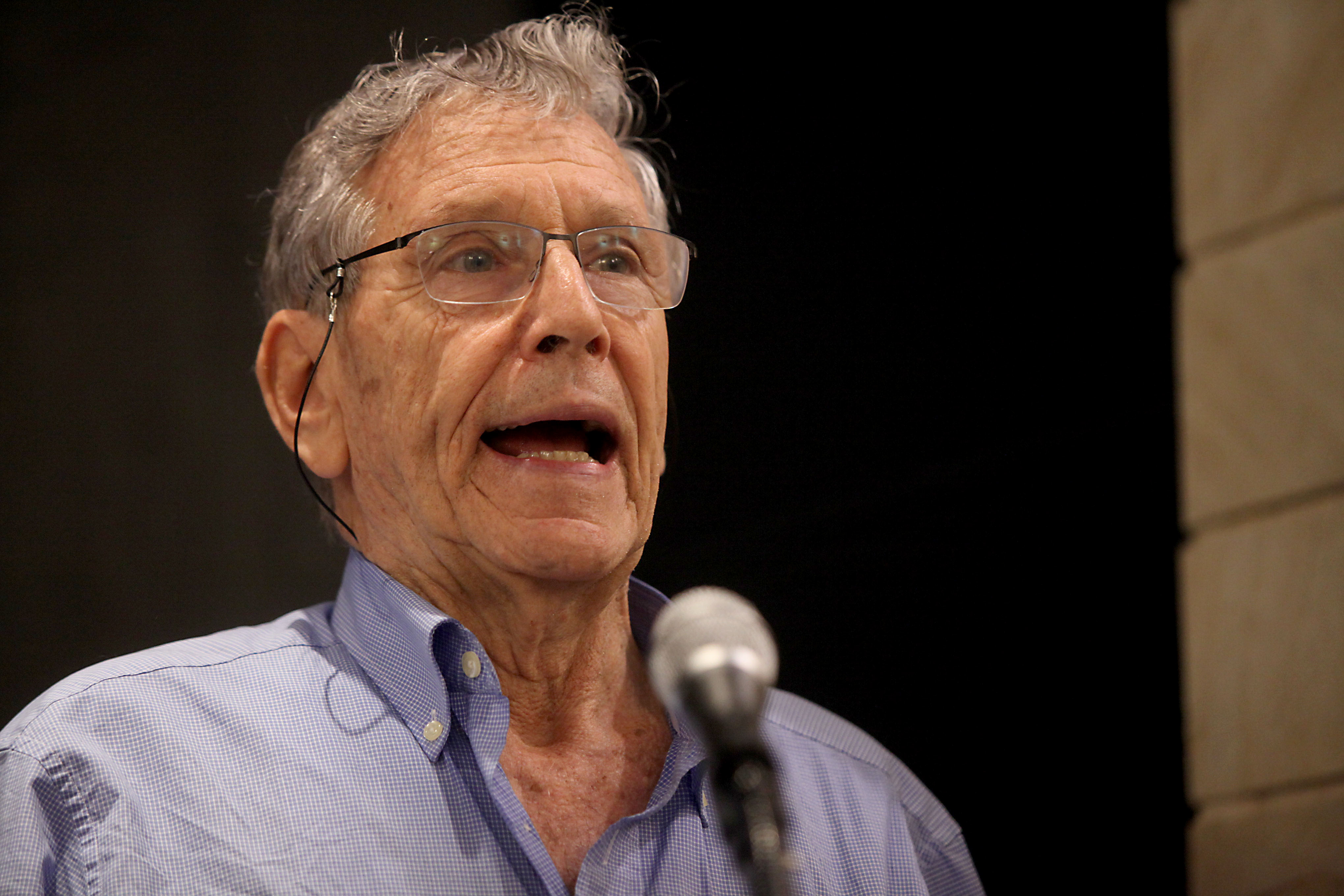OPINION: Amos Oz’s challenge to Israeli left is yet to be met
Top Israeli journalist and commentator Anshel Pfeffer examines the demise of Israel’s left and its future in the post-Netanyahu era
In the current issue of The Jewish Quarterly, Israeli journalist and political commentator Anshel Pfeffer examines the demise of Israel’s left and its future in the post-Netanyahu era. His essay, ‘The Strange Death and Curious Rebirth of the Israeli Left’, explores the left’s failure to articulate a persuasive vision of Israel’s national identity.
In this extract, Pfeffer looks at Labour’s hopes for revival under its current leader, Merav Michaeli.
Get The Jewish News Daily Edition by email and never miss our top stories Free Sign Up
During the lead-up to Israel’s election in March, few predicted that both Labour and Meretz would make it into the next Knesset, let alone into government.
Labour leader Merav Michaeli breathed some life back into Labour; then it was Meretz’s turn to plunge in the polls towards oblivion. Not for the first time, the party launched a “gevalt! campaign” to “save Meretz!” – hoping to shame recalcitrant leftists into turning out to vote for it.
Yet both parties exceeded expectations, easily crossing the threshold of 3.25 percent of the vote. Two months later, they joined the Bennett–Lapid coalition and helped unseat Binyamin Netanyahu, who had been in power for 12 long years. After being written off as dead, the Israeli left had been miraculously reborn. But it’s a tenuous rebirth. Labour and Meretz celebrated their gains, but the election result remains a far cry from their past glories. Especially for Labour, the party that founded the state of Israel and ruled for half its history.
The last time the parties of the left, Labour and Meretz, together with Arab parties, won a majority in the Knesset was in 1992. Labour and Meretz together won 56 seats in that election. Now they have 13. But Michaeli is convinced that, having “brought Labour back from the dead”, she can again make it a party of power.
Michaeli is different from previous Labour leaders. It’s not just her biography – Tel Aviv glamour girl transformed into radical feminist activist and now into mainstream politician, determined to return Labour to its heyday as the party of power. Michaeli is also much more clear-eyed than her predecessors on where Labour went wrong and the size of the mountain her party needs to climb to again challenge for power.
Privately, she admits that it will take longer than just a couple of election cycles. Unlike her predecessors, who tried to rebrand Labour as centrist, she doesn’t shy away from the “leftist” label.
Until 1977, Labour’s narrative was clear. It was the only party to be trusted with sailing the ship of Israel, navigating it through the treacherous shoals of the Middle East. Even after losing elections twice, in 1977 and 1981, Labour tried to use the disastrous war in Lebanon and the near-meltdown of Israel’s economy in the early 1980s as proof Likud could not be trusted with power.
But that message was only persuasive enough to gain a draw in 1984, after which Labour spent the next six years in unity governments with Likud, effectively conceding that they could indeed be trusted.
Then came the 1990s, during which Labour finally won two elections, spending half the decade in power, this time as “the peace camp” with the Oslo Accords. But the collapse of the Oslo process in 2000, after the failed Camp David summit between Ehud Barak and Yasser Arafat and the outbreak of the bloody Second Intifada, destroyed Israelis’ belief in peace with the Palestinians.
“It’s clear that, since 1977, we’ve lost our narrative and Barak finished off the peace narrative,” Michaeli says, referring to Barak’s comment after Camp David that “Israel doesn’t have a Palestinian partner for peace”. “I don’t have a clear answer on what the narrative is yet,” she admits disarmingly.
For such a forthcoming interviewee, Michaeli is unusually reticent on two issues. She isn’t very interested in talking about where the party stands on the occupation and the Israel–Palestine conflict more generally. The party’s official policy is still to support the two-state solution, but it doesn’t feature prominently in any of its leader’s speeches. Michaeli repeatedly calls Labour “the party of Yitzhak Rabin” but, when asked which parts of Rabin’s legacy she values the most, she highlights the social reforms his governments carried out, rather than Oslo. And then there’s the issue of the party to the right of Labour, the one that now occupies the centre ground – once Labour’s natural habitat.

Since its foundation in 2013, Yair Lapid’s ultra-centrist Yes Atid (“There Is a Future”) party has steadily eaten away at the urban middle-class base that was once Labour’s core constituency.
At first, Yesh Atid looked like just another centrist party, a breed that has never lasted long in Israeli politics before losing favour with the voters and splitting up. But Lapid has defied expectations, not only by keeping his party together for six elections, but also by evolving as a politician, becoming the architect of the government that has finally toppled Netanyahu. Taking Likud down was supposed to be Labour’s job; now Lapid has taken that away as well.
If the new government stays together, Lapid will replace Bennett as prime minister in August 2023, further boosting his chances of increasing Yesh Atid’s hold on the middle ground and cementing Labour’s relegation
to small-party status.
Now that the goal of ending Netanyahu’s reign has been realised, Michaeli has to contend with the fact that it was achieved by a centrist–right-wing alliance, the left-wing playing only a minor part in the denouement.

Photo by: Gideon Markowicz-JINIPIX
The question of whether Labour still has a role, perched uneasily between Yesh Atid and Meretz, remains open. In 2008, Amos Oz announced: “Labour has come to the end of its historic path. It no longer presents a national agenda and joins every coalition.”
Thirteen years later, Labour is still around, thanks largely to Michaeli’s efforts. But she is yet to answer Oz’s challenge and come up with a new agenda for the party.
- This is an extract of Anshel’s essay The Strange Death and Curious Rebirth of the Israeli Left in the current issue of The Jewish Quarterly, out now

Thank you for helping to make Jewish News the leading source of news and opinion for the UK Jewish community. Today we're asking for your invaluable help to continue putting our community first in everything we do.
For as little as £5 a month you can help sustain the vital work we do in celebrating and standing up for Jewish life in Britain.
Jewish News holds our community together and keeps us connected. Like a synagogue, it’s where people turn to feel part of something bigger. It also proudly shows the rest of Britain the vibrancy and rich culture of modern Jewish life.
You can make a quick and easy one-off or monthly contribution of £5, £10, £20 or any other sum you’re comfortable with.
100% of your donation will help us continue celebrating our community, in all its dynamic diversity...
Engaging
Being a community platform means so much more than producing a newspaper and website. One of our proudest roles is media partnering with our invaluable charities to amplify the outstanding work they do to help us all.
Celebrating
There’s no shortage of oys in the world but Jewish News takes every opportunity to celebrate the joys too, through projects like Night of Heroes, 40 Under 40 and other compelling countdowns that make the community kvell with pride.
Pioneering
In the first collaboration between media outlets from different faiths, Jewish News worked with British Muslim TV and Church Times to produce a list of young activists leading the way on interfaith understanding.
Campaigning
Royal Mail issued a stamp honouring Holocaust hero Sir Nicholas Winton after a Jewish News campaign attracted more than 100,000 backers. Jewish Newsalso produces special editions of the paper highlighting pressing issues including mental health and Holocaust remembrance.
Easy access
In an age when news is readily accessible, Jewish News provides high-quality content free online and offline, removing any financial barriers to connecting people.
Voice of our community to wider society
The Jewish News team regularly appears on TV, radio and on the pages of the national press to comment on stories about the Jewish community. Easy access to the paper on the streets of London also means Jewish News provides an invaluable window into the community for the country at large.
We hope you agree all this is worth preserving.
-
By Laurent Vaughan - Senior Associate (Bishop & Sewell Solicitors)
-
By Laurent Vaughan - Senior Associate (Bishop & Sewell Solicitors)
-
By Laurent Vaughan - Senior Associate (Bishop & Sewell Solicitors)
-
By Laurent Vaughan - Senior Associate (Bishop & Sewell Solicitors)























